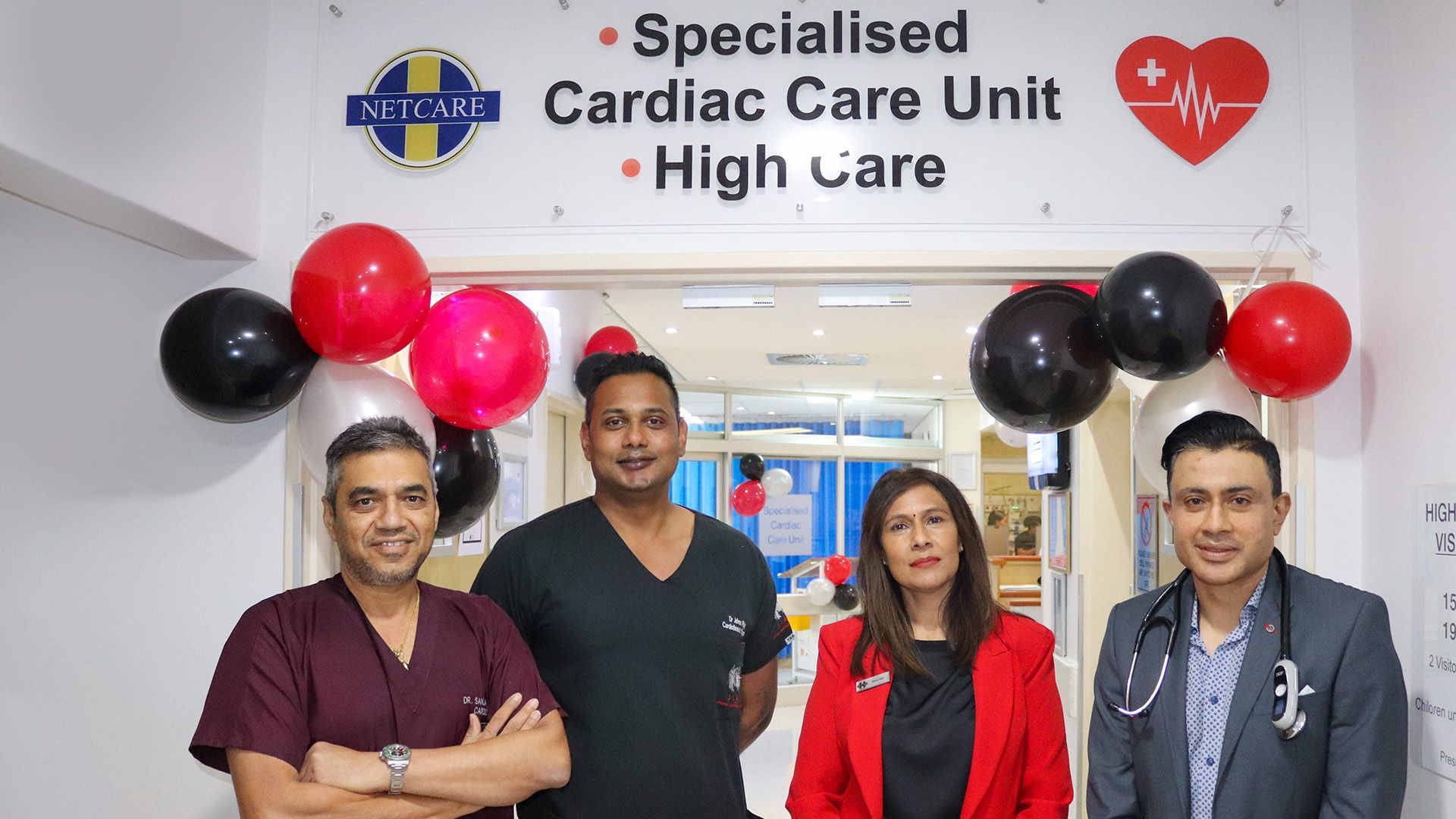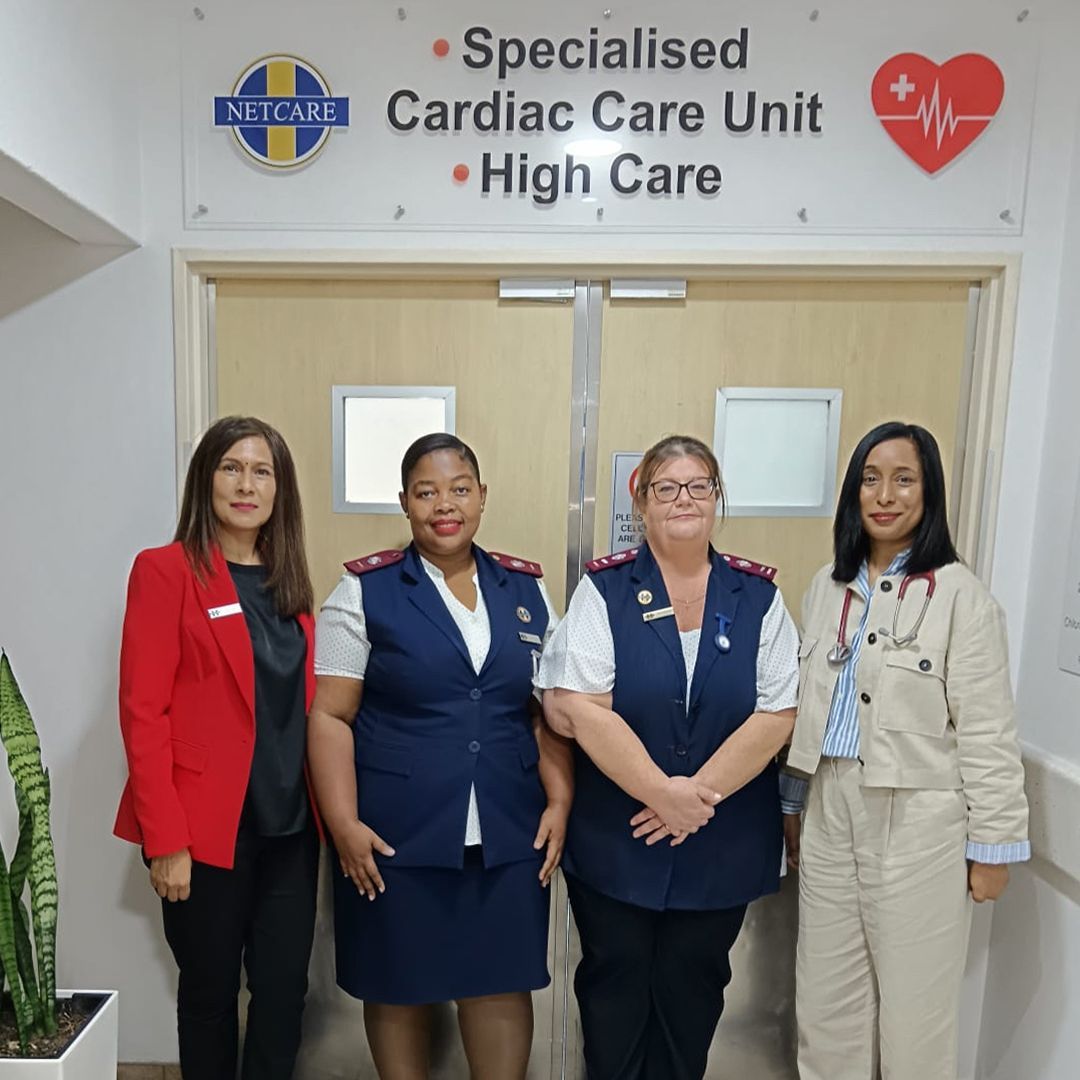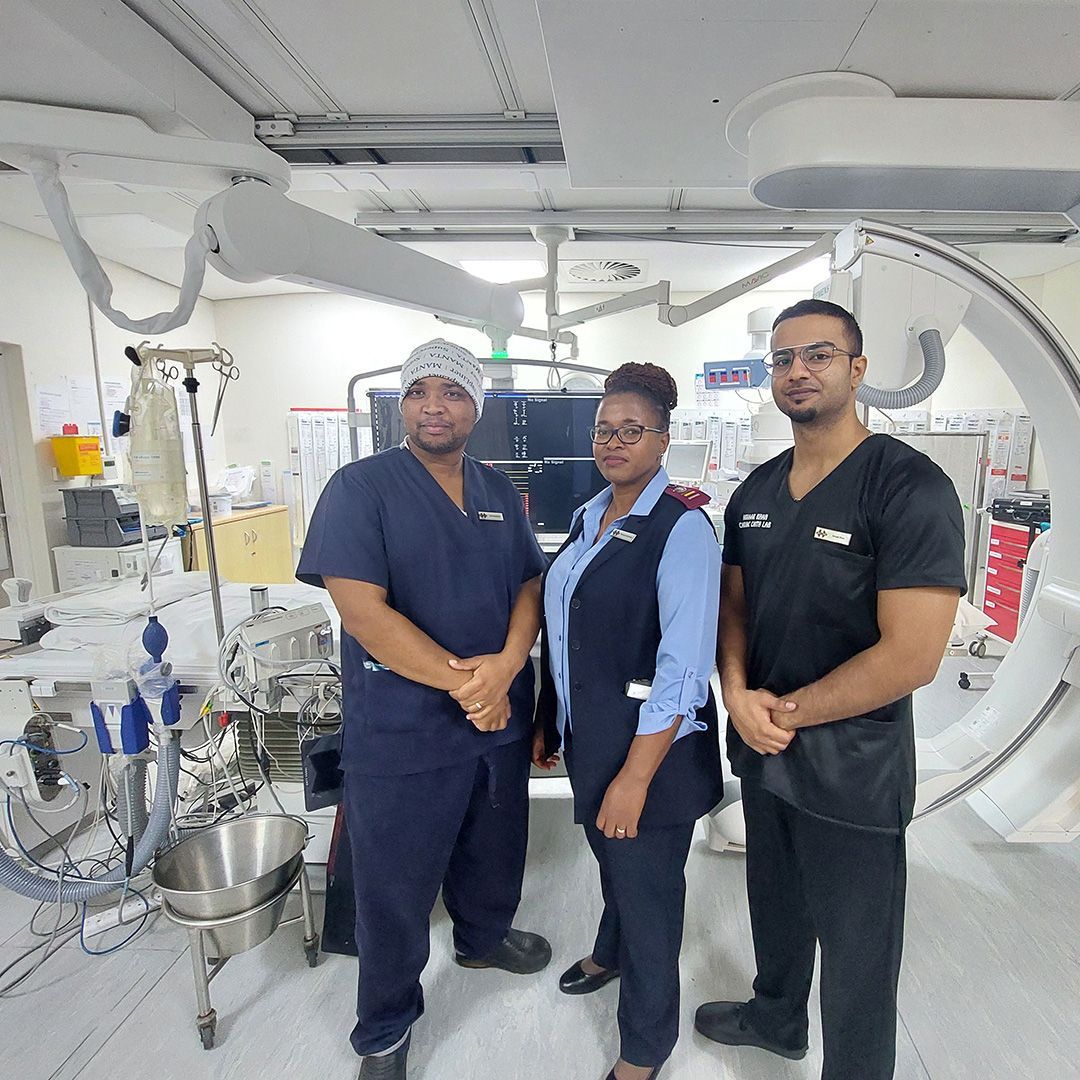Excellence in cardiac care with an eye on the future
(From left to right) Cardiologist Dr Sanjay Maharaj, resident cardiothoracic surgeon Dr Jehron Pillay, Netcare St Anne’s hospital general manager Sharon Singh and physician Dr Devan Gounder at the opening of the specialised cardiac care unit at Netcare St Anne’s Hospital.
Dedicated, world class heart unit boosts KZN capacity
Specialised cardiac care capacity in the KwaZulu-Natal Midlands has received a shot in the arm with the launch of a dedicated unit at Netcare St Anne’s Hospital.
“In recent months, on a daily basis, the city has had a shortage of cardiac beds. This initiative helps to address the growing need for specialised cardiac care here while ensuring timely and effective treatment in a state-of-the-art facility,” said general practitioner Dr Ellesh Narbharam Soni, who is the branch chairperson for the SA Medical Association (SAMA) in the KZN Midlands.
The specialised cardiac care unit, which strongly focuses on excellence in patient care through multidisciplinary specialist collaboration and advanced technology, will help alleviate this need for cardiac patients and enhance the quality of care available in Pietermaritzburg and its surrounding areas.
The frequent lack of beds has meant local patients must be transferred to hospitals out of town. The unit also complements Netcare St Anne’s Hospital’s existing facilities for cardiac patients, including a high-tech cardiac catheterisation laboratory and a fully equipped cardiac theatre.
“The opening of the new unit represents a culture of innovation, compassion, and excellence in cardiac care. It emphasises the importance of our multidisciplinary team, and we, as the general practitioners, form part of this team to help provide comprehensive cardiac care to our patients, ensuring holistic treatment and improved outcomes,” Dr Soni said at a ribbon-cutting ceremony hosted at the hospital and attended by specialist doctors, general practitioners, nurses and other support staff.
Resident cardiothoracic surgeon Dr Jehron Pillay, who has been at the forefront of establishing the new unit, said their team has developed an impressive spectrum of cardiac care complementary to the work others are doing in the field. “We’re doing advanced heart failure therapy, advanced catheterisation and advanced lung surgery, including transplantation.”
He paid tribute to the healthcare workers at Netcare St Anne’s Hospital, describing them as “a diverse, capable team with the potential to develop the unit to be on a par with anything in the world”.
Dr Pillay explained that the facility’s high-tech catheterisation laboratory houses sophisticated diagnostic imaging equipment used to visualise both the vascular system and the chambers of the heart. This enables cardiologists to diagnose specific cardiovascular conditions accurately, guiding their treatment through minimally invasive interventions.
“While the equipment we already have is state-of-the-art, we’ll be developing it continually. We are also planning more training to further upskill our team,” said Dr Pillay.
Speaking at the launch, the chairperson of the Netcare St Anne’s Hospital physician advisory board, resident physician Dr Devan Gounder, said the unit has a dynamic array of medical professionals on hand, including resident cardiologists Dr Yuvashnee Govender and Dr Kyi Shein.
“Not only does the facility have the support of local cardiologists and cardiothoracic surgeons and the hospital’s management team, but we also have a highly skilled multidisciplinary team available to assist with other non-cardiac complications. These specialists include intensivists, general physicians, pulmonologists, neurologists and nephrologists. Our cardiac ICU and ward nurses have recently received further advanced training to provide quality care to our patients in accordance with strict treatment and infection protocols.”
Commenting on the new development, resident cardiologist Dr Yuvashnee Govender said: “This has been a long awaited and much needed development for the people of Pietermaritzburg and surrounding areas. I am excited about the introduction of a dedicated cardiology discipline at the hospital as it holds the potential to significantly improve the quality of care for our cardiac patients. This development is not just an important milestone for the hospital, but a beacon of hope for the entire community. I am looking forward to working closely with the highly motivated and skilled cardiac team to deliver the best possible outcomes for our patients.”
Netcare St Anne’s Hospital general manager Sharon Singh said the unit adds significant value to the hospital’s wide range of care offerings and will support the work being done at Netcare St Anne’s Hospital, which is the only private level one trauma facility in the province.
According to Singh, having additional beds available in the new specialised cardiac care unit will enhance the hospital’s ability to administer person centred care to those admitted with cardiac-related symptoms through the trauma centre. “Our evidence-based approach is enhanced by our high-tech digital tools, resulting in a treatment plan specific to each patient. No two hearts are the same. Therefore, no two treatment plans can be the same,” Singh says.
Singh paid tribute to their dedicated nursing staff who have undergone specialised training to prepare them for the opening of the unit.
“It is so gratifying to see the synergy between the different specialists and various departments, always placing the patient at the centre of all our efforts.”
“This is not just an important milestone for Netcare St Anne’s Hospital, but a beacon of hope for the entire community,” according to resident cardiologist Dr Yuvashnee Govender. Hospital general manager Sharon Singh, is pictured with high are unit manager Tracy Scannell, ICU unit manager Cynthia Bhengu and Dr Govender.
Pictured inside the cardiac catheterisation laboratory at Netcare St Anne’s Hospital are cardiac registered nurses Fezile Kgohloane (left) and Abraar Khan (right) with nursing manager Precious Shelembe (centre).















